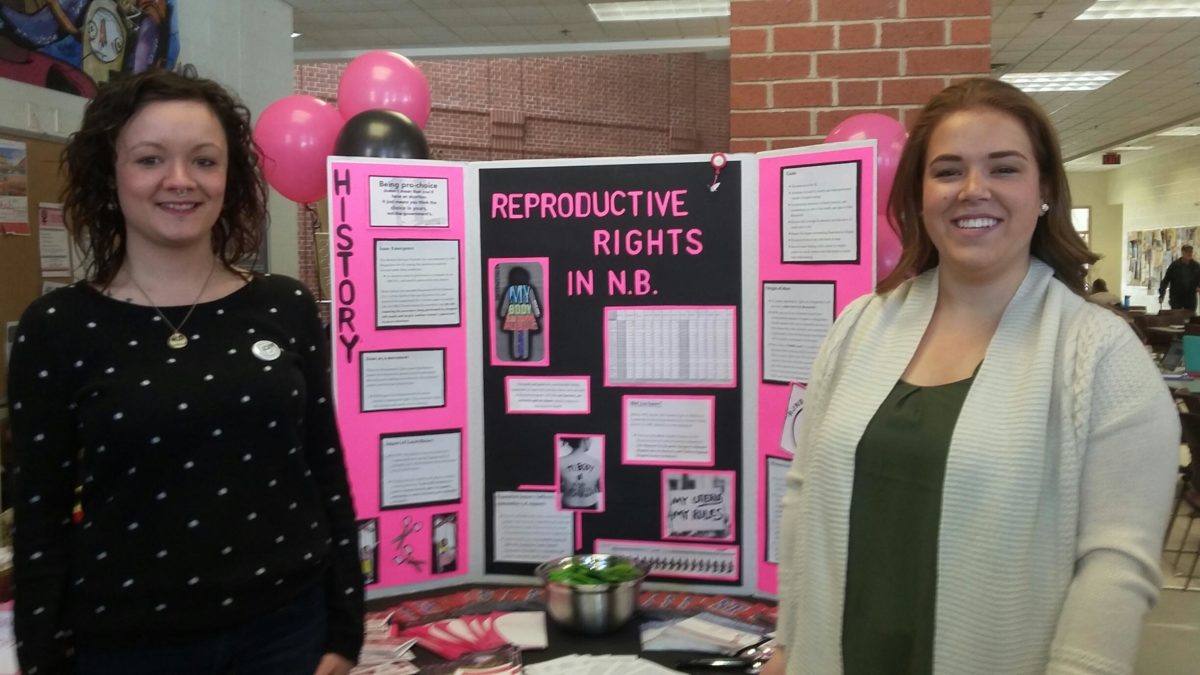Bachelor of Social Work students made Sir James Dunn Hall a hub for community action during their annual social action fair on March 20.
Tracy Glynn, a professor in the program who helps organize the event, said everyone involved was pleased to see students, professors and community members take in the students’ projects. She said students felt it was a positive experience.
“Some of them collected signatures to petitions and postcards to send to politicians while others showcased media they had produced. Some students attempted to dispel common misconceptions, stereotypes and myths that perpetuate oppression,” Glynn said.
“The students also appreciated the knowledge that was provided to them by those who stopped at their booths. Some of the students remarked that it took them out of their comfort zone and made them more confident to approach people.”
Glynn said students chose issues important to them. The projects explored intimate partner violence, aging and alternatives to nursing homes, homelessness, harm reduction and sex workers, child trafficking, reproductive rights and mental health issues, among others.
BSW student Kody Carlson said they focused broadly on different issues happening around them through “a social justice lens.”
Carlson’s group concerned PrEP, or Pre-Exposure Prophylaxis, an FDA-approved anti-HIV medication that keeps HIV-negative people from becoming infected.
“For our project, we really aimed to educate people about this mode of HIV prevention given the government’s current ideas of banning people from donating blood or organs or sperm as a means of prevention,” Carlson said.
“We thought maybe we’d give an alternative means for people to explore [in] preventing the spread of HIV/AIDS.”
Carlson has had personal experience fighting the Health Canada policy prohibiting men who have had sex with men within the last five years from donating organs. He said bringing an issue like this to the forefront garnered positive and passionate reactions from the public.
“Not a lot of people knew about PrEP as an option for safer sex, and people were outraged about the ban against gay men donating blood, organs and sperm … Some people were very happy to have been exposed to that as an option for their safer sex toolkit,” Carlson said.
Glynn said another group supported immigrants and refugees by calling for an end to policies like the Canada-U.S. Safe Third Country Agreement. They’re also partnered with the organization No One Is Illegal, a worldwide migrant justice movement. In addition, the group is working to make Fredericton a sanctuary city to ensure all people have access to services such as food banks, transition homes, shelters and libraries without fearing discrimination.
Carlson said the social action fairs and projects like these ones are about experiential learning and critical pedagogy.
“It takes the perspective of learning from doing action rather than learning about action and it really gives students an opportunity to connect with community partners, connect with politicians and government and really look at the social justice side of social work,” he said.
“At STU, we take a perspective of structural social work which stems from the radical tradition and we look at changing the structures in society that oppress people rather than changing the individual.”
Carlson said linking the university community with the outside community brings issues and research out of the “ivory tower of academia.”
“When you have program’s like St. Thomas University’s Bachelor of Social Work program that really involves community partners, you use the university as a catalyst for social change and you really take advantage of the resources the university has,” he said.
“It’s a really good opportunity to use the power of knowledge production that we have to enhance community.”

